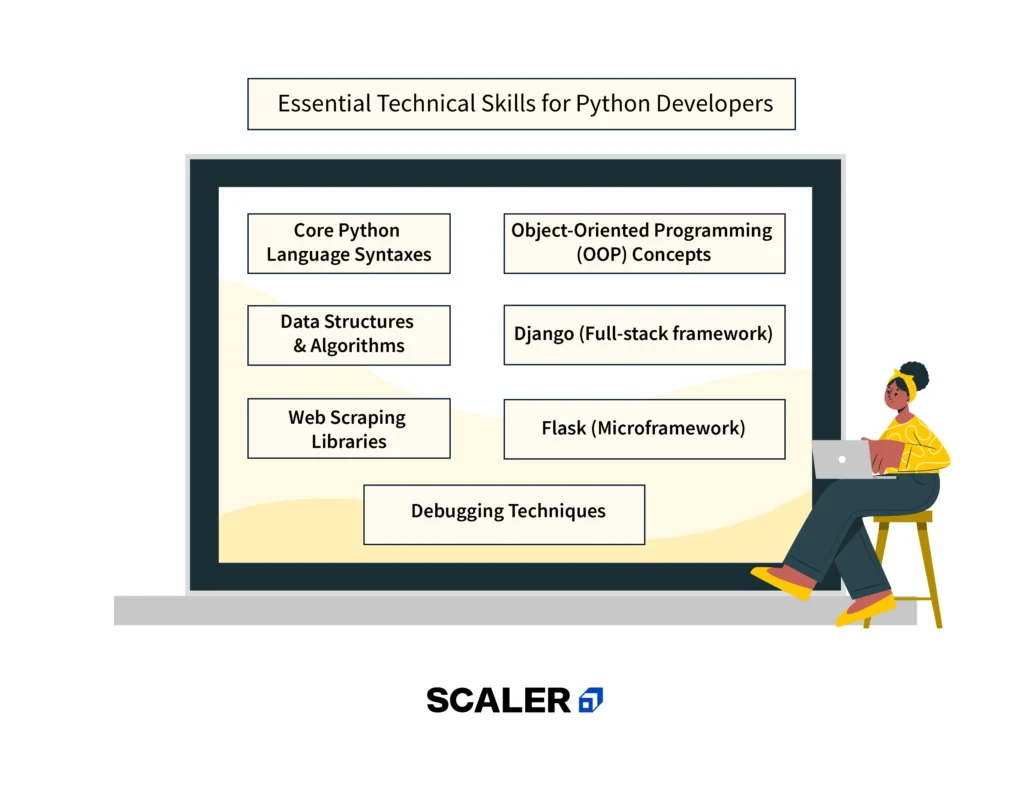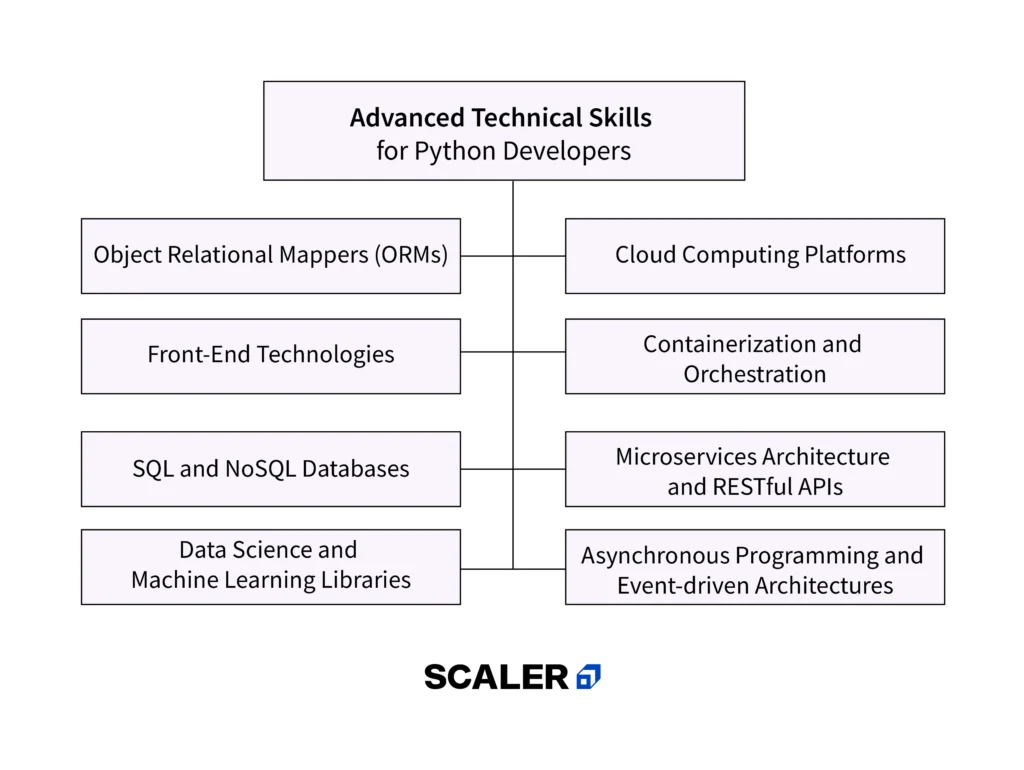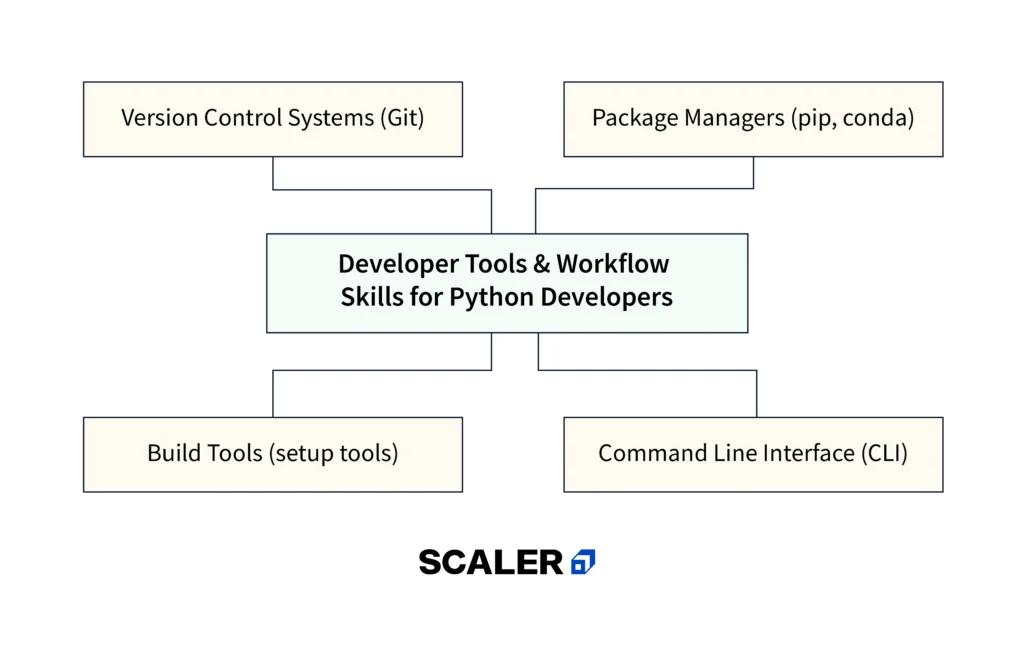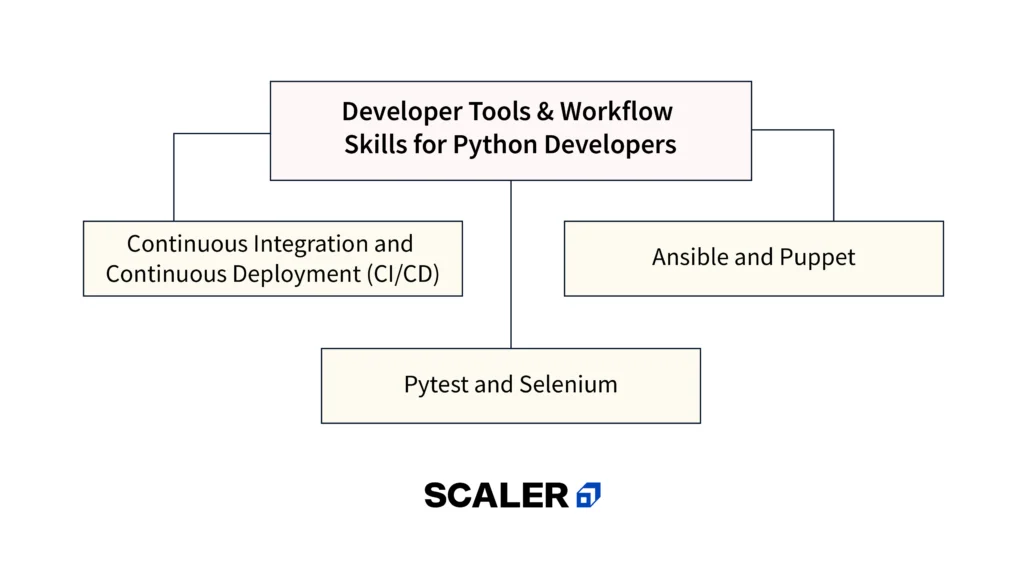Python’s versatility and user-friendly nature have solidified its position as one of the most in-demand programming languages today. Across various domains, from web development and data science to automation and machine learning, Python empowers developers to create powerful applications. Whether you’re a seasoned developer or just starting your Python journey, mastering a well-rounded skillset is crucial for success in 2024. This guide explores the essential technical and soft skills required to thrive as a Python developer in today’s dynamic tech landscape.
Importance of Python Developer Skills in 2024
The demand for skilled Python developers continues to surge across industries, making it a valuable skill to possess in today’s tech landscape. Here’s a breakdown of why Python developer skills are so crucial in 2024:
- Popularity: According to the PYPL Popularity of Programming Language Index, Python is the most searched programming language globally as of March 2024. This high search volume indicates strong interest and demand for Python developers.

- Job Market: The US Bureau of Labor Statistics projects a 23% growth in computer and information research scientist jobs, which often utilize Python for data science and analysis, between 2022 and 2032. This translates into a significant increase in job opportunities for skilled Python developers.
- Salary: Salary websites like Glassdoor and Indeed report average salaries for Python developers in the US ranging from $92,000 to $200,000 per year, depending on experience and location. This indicates Python skills are well-compensated in the job market.
- Versatility Across Domains: Python is a general-purpose language, meaning it can be used for various tasks beyond web development. It’s popular in data science, machine learning, automation, scripting, and scientific computing. This versatility makes Python developers valuable assets for companies across diverse industries.
- Large Community and Resources: Python boasts a vast standard library and a thriving community of developers. This translates to an abundance of online resources (tutorials, forums, libraries) for learning and troubleshooting, making it easier for aspiring developers to acquire Python skills and stay updated.
Essential Technical Skills for Python Developers
This section dives into the fundamental building blocks of Python programming. Mastering these core concepts will empower you to write clean, efficient, and maintainable Python code.

1. Core Python Language Syntaxes
The basic building blocks that define how you write Python programs. It includes elements like variables, data types (text, numbers, booleans, etc.), operators (used for calculations and comparisons), control flow statements (if/else, loops), and functions (reusable blocks of code).
Importance: Understanding core syntax is essential for writing any Python program. A solid grasp of these fundamentals allows you to construct well-structured code and perform operations effectively.
Top Topics to Learn:
- Data types and variables (numbers, strings, booleans, lists, dictionaries)
- Operators (arithmetic, comparison, logical)
- Control flow statements (if/else, for loops, while loops)
- Functions (defining, calling, parameters, return values)
2. Object-Oriented Programming (OOP) Concepts
A programming paradigm that revolves around objects, which are data structures that encapsulate data (attributes) and related operations (methods). OOP principles include inheritance, polymorphism, and encapsulation.
Importance: OOP promotes code reusability, modularity, and maintainability. By structuring your code using OOP concepts, you can create well-organized and scalable applications.
Top Topics to Learn:
- Classes and objects
- Inheritance (creating new classes based on existing ones)
- Polymorphism (objects responding differently to the same method call)
- Encapsulation (bundling data and methods together within a class)
3. Data Structures & Algorithms
Data structures are specialized formats for organizing and storing data efficiently. Common examples include lists, tuples, dictionaries, and sets. Algorithms are step-by-step procedures for solving problems or performing computations.
Importance: Choosing the right data structure and algorithm for your task is crucial for optimizing the performance and efficiency of your Python code.
Top Topics to Learn:
- Common data structures (lists, tuples, dictionaries, sets)
- Basic algorithms (searching, sorting, traversing)
- Time and space complexity analysis of algorithms
4. Django (Full-stack framework)
A high-level Python web framework that allows for rapid development of secure and scalable web applications. It provides a robust structure for handling tasks like database interaction, user authentication, URL routing, and templating.
Importance: Django is a popular choice for building complex web applications. Using a framework like Django can streamline development, reduce boilerplate code, and promote best practices.
Top Topics to Learn:
- Django project structure (models, views, templates)
- User authentication and authorization
- Database interaction with Django ORM
- URL routing and templating
5. Flask (Microframework)
A lightweight and flexible Python web framework well-suited for building smaller web applications or APIs. Flask offers more control over the application structure compared to Django.
Importance: Flask empowers developers to create customized web applications without the overhead of a full-fledged framework. It’s ideal for projects requiring a smaller footprint or more control over specific functionalities.
Top Topics to Learn:
- Flask routing and request handling
- Building APIs with Flask
- Templating with Flask
- Extending Flask functionality with extensions
6. Web Scraping Libraries
Python libraries like Beautiful Soup or Scrapy are used to extract data from websites. This process, called web scraping, involves parsing HTML content and retrieving specific data points.
Importance: Web scraping automates data collection from websites. This skill is valuable for various tasks like market research, price comparison, and data analysis.
Top Topics to Learn:
- Using libraries like Beautiful Soup or Scrapy
- Extracting data from HTML elements
- Handling dynamic content and pagination
- Responsible web scraping practices
7. Debugging Techniques
Debugging is the process of identifying and resolving errors (bugs) in your Python code. Effective debugging involves using various tools and techniques to pinpoint the root cause of issues and fix them.
Importance: Efficient debugging is essential for any programmer. Being able to identify and resolve bugs quickly is crucial for maintaining clean and functional code.
Top Topics to Learn:
- Using a debugger (e.g., pdb) to step through code execution
- Identifying common errors (syntax errors, runtime errors)
- Utilizing print statements and logging for tracing code execution
- Effective debugging strategies and problem-solving techniques
Advanced Technical Skills for Python Developers
As you progress in your Python development journey and tackle more complex projects, consider expanding your skillset with these advanced areas. Mastering these skills will open doors to specialized Python development roles and allow you to contribute to high-performance applications.

8. Object Relational Mappers (ORMs)
ORMs are libraries that bridge the gap between relational databases (like MySQL or PostgreSQL) and object-oriented programming languages like Python. They simplify data access by allowing you to interact with databases using Python objects.
Importance: ORMs streamline database interaction in Python applications. They reduce boilerplate code for CRUD (Create, Read, Update, Delete) operations and handle complex queries more efficiently.
Top Topics to Learn:
- Popular ORMs for Python (SQLAlchemy, Django ORM)
- Object-relational mapping concepts (models, relationships, migrations)
- Performing CRUD operations with ORMs
- Writing complex database queries using ORMs
9. Front-End Technologies
While not strictly Python-specific, understanding HTML, CSS, and JavaScript is crucial for full-stack web development using Python frameworks like Django. These languages control the visual presentation and interactivity of web pages.
Importance: A well-rounded Python developer with front-end knowledge can build the entire application stack, from back-end logic to user interface. This skill set is valuable for full-stack development roles and allows for greater control over the overall user experience.
Top Topics to Learn:
- Core HTML elements and structure
- CSS styling for layout and presentation
- JavaScript fundamentals (variables, functions, DOM manipulation)
- Front-end frameworks like React or Vue.js (optional)
10. SQL and NoSQL Databases
SQL (Structured Query Language) is used to interact with relational databases, where data is stored in structured tables with rows and columns. NoSQL databases offer more flexibility for storing and managing unstructured or semi-structured data.
Importance: Understanding both SQL and NoSQL databases equips you to choose the right database technology for your project’s specific needs. SQL is essential for working with relational data, while NoSQL is valuable for big data or schema-less applications.
Top Topics to Learn:
- SQL fundamentals (SELECT, INSERT, UPDATE, DELETE)
- Writing complex SQL queries (joins, subqueries)
- Relational database concepts (normalization)
- NoSQL database concepts (document stores, key-value stores)
- Popular NoSQL databases (MongoDB, Cassandra)
11. Data Science and Machine Learning Libraries
Python offers a rich ecosystem of libraries like NumPy, Pandas, scikit-learn, and TensorFlow for data science and machine learning tasks. These libraries provide tools for data manipulation, analysis, model building, and deployment.
Importance: By mastering these libraries, you can leverage Python for data-driven applications. This skillset is in high demand for fields like data science, machine learning, artificial intelligence, and business intelligence.
Top Topics to Learn:
- Data manipulation with NumPy and Pandas
- Exploratory data analysis techniques
- Machine learning algorithms (classification, regression)
- Deep learning with libraries like TensorFlow or PyTorch
12. Asynchronous Programming and Event-driven Architectures
Asynchronous programming allows your application to handle multiple tasks concurrently without blocking. Event-driven architectures leverage events (signals) to trigger actions and improve responsiveness. These concepts are often used together for building scalable web applications.
Importance: Asynchronous programming and event-driven architectures enable you to build highly responsive and efficient web applications that can handle a large number of concurrent users. This is crucial for modern web development.
Top Topics to Learn:
- Asynchronous programming concepts (coroutines, callbacks)
- Event-driven architecture patterns
- Libraries for asynchronous programming (asyncio)
13. Containerization and Orchestration
Containerization (e.g., Docker) packages your application code and its dependencies into a lightweight container, ensuring consistent execution across different environments. Orchestration tools (e.g., Kubernetes) manage the deployment, scaling, and networking of containerized applications.
Importance: Containerization and orchestration simplify application deployment and management, especially in cloud environments. These skills are valuable for building and scaling complex applications efficiently.
Top Topics to Learn:
- Docker container fundamentals (building, running, sharing containers)
- Container orchestration with Kubernetes
- Deploying containerized Python applications
14. Microservices Architecture and RESTful APIs
Microservices architecture decomposes an application into smaller, independent services that communicate with each other through well-defined APIs (Application Programming Interfaces). RESTful APIs adhere to design principles that promote interoperability and communication between services.
Importance: Microservices architecture enables building complex applications as modular and scalable units. RESTful APIs facilitate communication between these services and external clients, ensuring flexibility and loose coupling.
Top Topics to Learn:
- Microservices architecture concepts (services, APIs, communication)
- Designing and developing microservices in Python
- Building RESTful APIs with Python frameworks like Flask-RESTful
- API design principles (REST principles, resource representation)
15. Cloud Computing Platforms
Cloud computing platforms like AWS, Google Cloud Platform, or Microsoft Azure offer on-demand access to computing resources like servers, storage, databases, and networking. This allows developers to deploy and manage Python applications in a scalable and cost-effective manner.
Importance: Cloud platforms provide a robust infrastructure for deploying and scaling Python applications. Understanding these platforms empowers developers to leverage cloud services for building modern and distributed applications.
Top Topics to Learn:
- Major cloud computing platforms (AWS, GCP, Azure)
- Deploying Python applications on cloud platforms
- Cloud storage services (S3 buckets, Cloud Storage)
- Cloud databases and serverless computing
Developer Tools & Workflow Skills for Python Developers
Efficient development workflows are essential for any Python developer. Mastering these tools will streamline your development process, improve collaboration, and ensure the maintainability of your codebase.

16. Version Control Systems (Git)
Git is a distributed version control system (VCS) that allows you to track changes to your code over time. It facilitates collaboration by enabling developers to see the history of changes, revert to previous versions, and merge code effectively.
Importance: Git is an industry-standard for version control. Using Git ensures your code is well-organized, traceable, and recoverable in case of errors. It also promotes collaboration by enabling multiple developers to work on the same project simultaneously.
Top Topics to Learn:
- Git fundamentals (adding, committing, pushing, pulling)
- Branching and merging strategies
- Working with remote repositories (GitHub, GitLab)
- Utilizing Git features for collaboration (pull requests, code reviews)
17. Package Managers (pip, conda)
Package managers like pip (for Python Package Index) and conda (for Anaconda) simplify the installation and management of Python libraries and dependencies. They ensure all project dependencies are installed correctly and avoid version conflicts.
Importance: Package managers streamline the process of managing external libraries required for your Python projects. They ensure consistent environments and avoid compatibility issues that can arise from manual library installation.
Top Topics to Learn:
- Using pip to install and manage Python packages
- Creating virtual environments with tools like venv
- Utilizing conda for environment management (especially for data science projects)
- Understanding package dependencies and resolving conflicts
18. Build Tools (setup tools)
Build tools like setup tools are used to automate the process of packaging your Python project for distribution. They create installable packages that can be easily shared with others or uploaded to public repositories like PyPI.
Importance: Build tools ensure your Python project can be easily installed and used by others. This is valuable for collaborating on projects, sharing reusable code, and publishing libraries.
Top Topics to Learn:
- Packaging Python projects with setup tools
- Creating setup.py files and defining project metadata
- Distributing packages through PyPI or other repositories
- Understanding common build tools and their functionalities
19. Command Line Interface (CLI)
The command-line interface (CLI) is a text-based interface for interacting with your computer or running Python code. Understanding the CLI empowers you to automate tasks, use version control systems effectively, and manage your development environment efficiently.
Importance: While graphical user interfaces (GUIs) exist for many tools, proficiency in the CLI provides a powerful and flexible way to interact with your system and Python tools. It allows for scripting automation and efficient development workflows.
Top Topics to Learn:
- Basic Linux/macOS terminal commands (navigation, file manipulation)
- Using the Python interpreter in the CLI
- Utilizing CLI tools for package management (pip) and version control (Git)
- Automating tasks with shell scripting (optional)
DevOps and Automation Skills
As the software development landscape evolves, understanding DevOps principles and automation techniques becomes increasingly valuable for Python developers. These skills bridge the gap between development and operations, enabling faster deployments, improved code quality, and efficient infrastructure management.

20. Continuous Integration and Continuous Deployment (CI/CD)
CI/CD is a software development practice that automates the process of building, testing, and deploying applications. CI involves integrating code changes frequently, while CD focuses on automating the deployment process to production environments.
Importance: CI/CD streamlines the software delivery pipeline, accelerating development cycles and reducing the risk of errors in production. It allows for faster releases, improved code quality, and more reliable deployments.
Top Topics to Learn:
- CI/CD principles and methodologies
- Tools for CI/CD (e.g., Jenkins, GitLab CI/CD)
- Automating build, test, and deploy processes
- Integrating CI/CD pipelines with version control systems
21. Ansible and Puppet
Ansible and Puppet are configuration management tools used to automate the provisioning, configuration, and management of IT infrastructure. They ensure consistent system configurations across servers and environments.
Importance: Configuration management tools streamline infrastructure management, reduce manual errors, and enable efficient scaling of server deployments. They are valuable for managing complex infrastructure setups.
Top Topics to Learn:
- Configuration management concepts (infrastructure as code)
- Using Ansible or Puppet for infrastructure automation
- Writing configuration playbooks or modules
- Managing server configurations and deployments
22. Pytest and Selenium
Pytest is a popular Python testing framework that facilitates writing unit tests and integration tests for your Python code. Selenium is a web automation framework that allows you to automate browser interactions for testing web applications.
Importance: Testing is crucial for ensuring code quality and application functionality. Pytest provides a powerful and flexible framework for writing comprehensive tests, while Selenium enables automated testing of web applications, saving time and effort.
Top Topics to Learn:
- Pytest features and test writing techniques
- Unit testing and integration testing concepts
- Web automation with Selenium
- Automating browser interactions and web application testing
Soft Skills for Python Developers
Beyond technical expertise, possessing strong soft skills is essential for success as a Python developer in today’s collaborative work environments. These complementary skills will enhance your ability to work effectively with others, communicate your ideas clearly, and tackle challenges creatively.

23. Problem-solving abilities
- Developing a systematic approach to identifying, analyzing, and resolving technical problems.
- Thinking critically and creatively to find efficient solutions.
- Learning from debugging experiences and continuously improving problem-solving strategies.
24. Collaboration and teamwork
- Working effectively within a team to achieve common goals.
- Communicating ideas clearly and concisely with team members.
- Being adaptable and open to feedback from colleagues.
- Contributing positively to a collaborative development environment.
25. Communication skills
- Clearly and concisely conveying technical concepts to both technical and non-technical audiences.
- Effectively documenting code and design decisions for future reference.
- Actively listening to understand project requirements and user needs.
- Collaboratively discussing solutions and explaining technical trade-offs.
Tips on Developing These Python Skills
Mastering Python requires dedication, practice, and a continuous learning mindset. Here are some valuable tips to help you develop the Python developer skills outlined in this guide:
- Start with a Strong Foundation: Begin with a beginner-friendly Python course or tutorial. Solidify your understanding of core syntax, data structures, and control flow.
- Practice Consistently: Dedicate time each day or week to practice coding in Python. Solve coding challenges on platforms like HackerRank or LeetCode.
- Build Mini-Projects: As you progress, put your learning into practice by building small Python projects.
- Explore Advanced Topics: Once comfortable with the basics, delve into advanced areas like web development frameworks (Django, Flask), data science libraries (NumPy, Pandas), or machine learning (scikit-learn).
- Take Online Courses: Numerous online platforms offer high-quality Python courses on various specializations. Choose courses that align with your interests and career goals. caler Topics offers a free Python course with certification that covers key topics such as Python basics, data structures, object-oriented programming, and more.
- Participate in Open Source Projects: Contributing to open-source projects allows you to learn from experienced developers, gain practical experience, and build your portfolio.
- Follow Python Blogs and Communities: Stay updated on the latest Python trends and best practices by following relevant blogs, forums, and communities such as PySlackers, NHS Python, etc.
- Read Python Books and Documentation: Refer to well-regarded Python books and official documentation for in-depth learning and reference.
- Attend Meetups and Conferences: Network with other Python developers by attending meetups or online conferences. These events offer valuable learning opportunities and a chance to connect with the Python community.
How Scaler Academy Can Help You Develop These Skills?
Scaler Academy positions itself as a valuable resource for aspiring and intermediate Python developers seeking to enhance their skills and advance their careers. Here’s how their offerings can specifically address the skill areas covered in this guide:
- Core Python Skills & Problem-solving
- Advanced Skillsets (Frameworks, Libraries, etc.)
- Soft Skills and Career Development
By combining a structured curriculum, expert guidance, practical application, and career support, Scaler Academy can be a valuable platform for individuals aiming to become well-rounded and in-demand Python developers.
Conclusion
Mastering Python opens doors to exciting opportunities. This guide provided a roadmap for developing essential and advanced 20+ Python developer skills, along with valuable soft skills. Remember, consistent practice, a growth mindset, and the right learning resources are key to your success. Sharpen your Python skills and embark on a rewarding career path!
What does a Python developer do?
Python developers use the Python programming language to build software applications. Their tasks can range from back-end development (server-side logic) using frameworks like Django to data science and machine learning with libraries like NumPy and TensorFlow.
Is Python in high demand?
Yes, Python is one of the most in-demand programming languages globally. Stack Overflow Developer Surveys consistently rank it at the top for both usage and developer satisfaction.
How long does it take to become a Python developer?
The timeframe depends on your prior programming experience and learning intensity. With dedication, you can grasp core Python concepts in a few months. Building advanced skills and becoming job-ready might take 1-2 years.
Are there any specific Python frameworks or libraries that are particularly in demand in 2024?
Popular frameworks like Django (web development) and Flask (microframeworks) remain sought-after. Data science libraries (NumPy, Pandas) and machine learning tools (scikit-learn, TensorFlow) are also in high demand.
What jobs can I get with Python developer skills?
Python skills can lead to various roles like back-end developer, full-stack developer (if you combine front-end skills), data analyst, data scientist, automation engineer, and more.
Are there any industry-specific skills that Python developers should focus on?
Yes, some industries leverage Python heavily. For example, finance might require knowledge of financial data analysis libraries, while web scraping skills could be valuable for e-commerce.
Is it necessary to have a formal education in computer science to become a successful Python developer?
Not necessarily. Many Python developers come from non-CS backgrounds. Strong problem-solving skills, a passion for learning, and the ability to leverage online resources can equip you for success. However, a CS degree can provide a strong foundation in computer science concepts.
